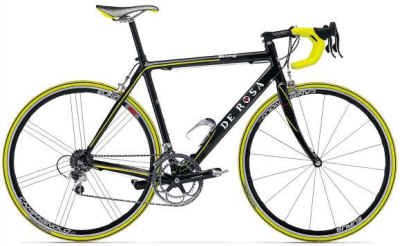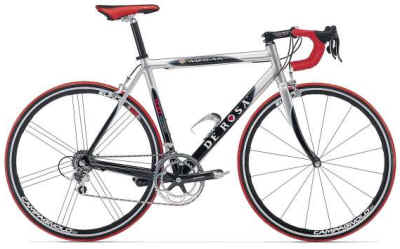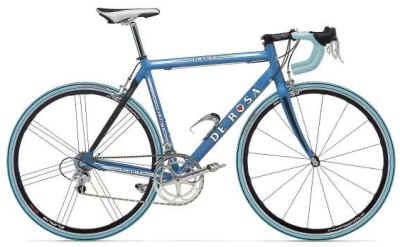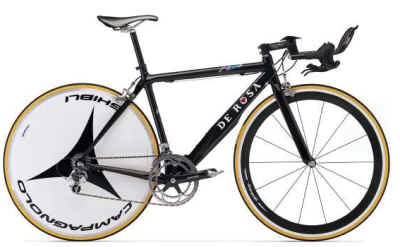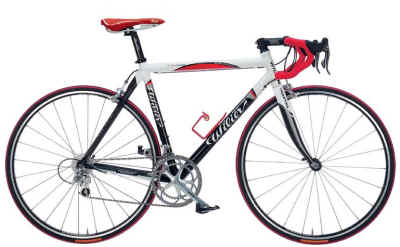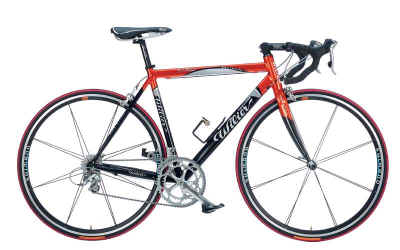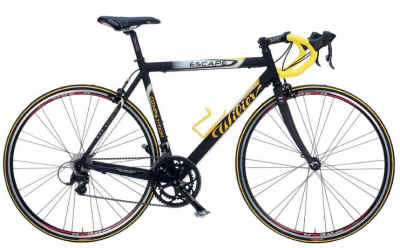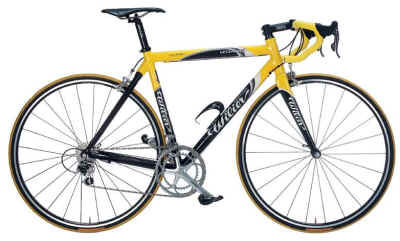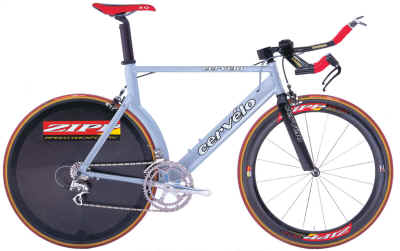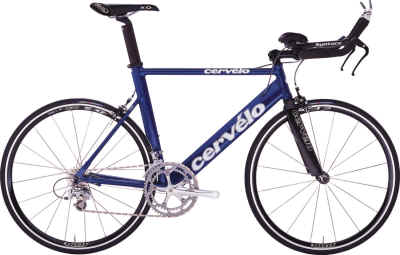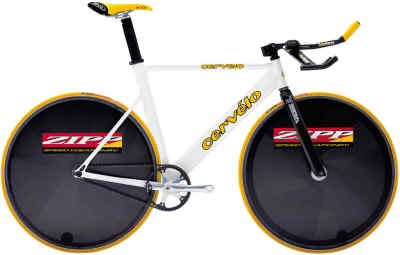SUPERSTORE, SUPER RANGE |
|
In the run-up to the 2003 season the Cycle Superstore has introduced many mouth-watering products to its range of stock, including the addition of 500 items to their online store at www.cyclesuperstore.ie In total over 2000 items can now be purchased over the internet. In-store an even greater range is available, with hi tech frames, wheelsets, component groups, clothing and accessories among the products on display in their spacious showroom near the Square shopping centre in Tallaght.
Of particular interest are the additions to their range of racing frames, with several new and very tempting products on offer. The Cycle Superstore are sole importers for highly regarded brandnames such as Wilier, Deda, Flanders, ALAN and Cervelo, as well as stocking frames by legendary manufacturers Pinarello, De Rosa and others. A brief outline of some of the new framesets now follows: De Rosa:It is no accident that the emblem of this highly-regarded Italian manufacturer is a red heart, for the company’s long association with the bike industry has been a tale of passion and dedication. Over the past five decades Ugo de Rosa’s bicycles have been ridden by many of the great champions, amongst them Raphael Geminiani, Rik Van Looy, Gianni Motta, Roger de Vlaeminck and the Cannibal himself, Eddy Merckx, with world champions Moreno Argentin and Romans Vainsteins among the more recent to profit from his craftsmanship. Choosing to remain a small, tightly-run enterprise rather than churn out vast numbers of frames, the de Rosa family have ensured that their name is one of the most highly regarded in the industry.
One tale which illustrates the esteem with which de Rosa is regarded comes from the period after Merckx’s retirement, when the Belgian superstar was embarking on a career building bicycles. Realising that he had much to learn in this area, he flew de Rosa to Belgium from his base in Milan and picked the Italian’s brains about the requirements of setting up a factory and frame construction, thus learning what would otherwise have taken years to find out. Given this story, it is little wonder that Cycle Sport listed de Rosa bicycles amongst their top ten greats of all time. Some time has passed since that judgement, but looking at the continued quality and craftsmanship of frames such as the King, Merak, Planet and Fluid models, there is no doubt that de Rosa still has both the magic and the heart which makes these frames so special.
The flagship model of the series is the King, a full carbon modular construction frameset which comes in four colours and six different sizes and which has attracted rave reviews. Light, stiff, but also very comfortable to ride, the King is regarded by many as a beautiful frame. King: EUR 3275.00
The stunning-looking Merak is constructed from De Rosa custom oversized alloy tubing, using their preferred Dedacciai V107 material to make a frame which is both light and strong and which has proved to be the highest selling of the De Rosa machines. Available with a sloping top tube, the Merak also features an integrated headset, which further adds to the clean lines of the frame. Merak: EUR 1899
The de Rosa Planet is constructed from Dedacciai SC61.10 tubing and has a carbon wish bone rear. This too is available with a sloping top tube and integrated headset and weighs just 1250 grams for the 55 cm model. Planet: EUR 1789.00
The Fluid is a stunning frameset which is similar to the King model, and is available to order. Fluid: To order.
Wilier:Ever since the company was founded by Pietro Dal Molin in 1906, Italian-built Wilier frames have enjoyed many great successes in cycling. Fiorenzo Magni’s 1948 Giro win, Marco Pantani’s two thrilling victories in the 1997 Tour (Alpe d’Huez and Morzine) and Sergei Gonchar’s 2000 world time trial championship rank amongst the palmares of the respected Italian framebuilder. Davide Rebellin rose to the world number one position abroad one of their steeds in 2001, and while he changed teams and consequently bicycle suppliers this year, it is rumoured that the Italian rode a disguised Wilier frame throughout the season. In 2003 Rebellin’s Gerolsteiner team and the Lampre outfit will both be using Wilier Izoard models.
This frameset is one of the most technically advanced in the peloton, using an exotic blend of materials in order to create a fast, comfortable ride. A scandium compact geometry frame forms the basis of the bike, with a thin layer of carbon fibre wrapped around the top, seat and down-tubes. This carbon-wrapping combines with the carbon rear triangle and carbon forks to dramatically reduce road shock. The Izoard is available with both standard and sloping top-tubes, and comes complete with a headset and a Selcof carbon seatpost.
The Alpe d’Huez is constructed from Easton Race 7000 alloy tubing and features a carbon wishbone rear and a full carbon fork. This highly-regarded frame is available with either a standard or sloping top tube. Alpe d’Huez: EUR 1150.00 Cycle Sport verdict (Alpe d’Huez model tested): ‘This machine came close to being perfect…I climbed, I sprinted, I cruised and I cornered and the performance was consistent: responsive, quick and easy. Distinctive and stylish, the eye-grabbing Wilier Alpe d’Huez was a great ride, responsive and fast. Even better, those attributes didn’t come at the price of comfort or control.’
The Sestriere Monobox is a mouthwatering prospect, constructed from ultra-lightweight Deda U2 tubing (1.16 kg frame) and boasting the new Deda Monobox carbon rear triangle. The front end of this fine-looking frameset carries the Deda Black Magic 2 integrated fork, and comes complete with a headset and a Selcof carbon seat post. Sestriere Monobox: EUR 1950.00
The Escape represents excellent value, selling at a reasonable price and using Amadeus alloy tubing and a full carbon fork. Escape: EUR 460
Izoard: EUR 2165 Cervelo:Perhaps the most unconventional looking bikes on offer are those available as part of the Cervelo range. The brand name originates from a mixture between the Italian word for brain, cervello, and the French term for bicycle, velo. ´It´s a brainbike, or a bike with some extra thought put into it´, say the manufacturers on their website www.cervelo.com, and while it is hardly unusual for companies to claim their product is different, in this particular case it is obvious that the Canadian manufacturer has looked at the frame in a completely new way. The unconventional shape of the P3 was designed with a view to reducing aerodynamic drag as much as possible, with the unusually shaped seat tube plunging vertically downwards before hugging the curve of the rear wheel to the junction with the bottom bracket. According to Cervelo, this cutout ´covers the rear wheel over a greater height, with its width matching the width of the rear tyre perfectly along this height. As a result’, they claim, ‘the P3 offers almost double the aerodynamic coverage for the rear wheel in comparison to the next best available frame. ...Furthermore, the seattube and the seatpost are 25% narrower to minimise the frontal area and aerodynamic drag.’
Coverage of the P3 rearwheel cutout (right) vs. standard cutout Cervelo’s method of channelling airflow over the rear section is of obvious theoretical benefit but another plus is the shape of the main tubes of the frame. Eliptical at the front, these taper back into a teardrop cross-section, further facilitating the smooth passage of air over the bike and thus increasing speed at a given power output. This should translate into better cycling performance and, consequently, better results. But surely there is a catch? Fear not: the frame is perfectly legal under the UCI rules introduced on January 1st 2000, meeting all of their requirements governing the geometry of bicycle frames.
Looking at the P3, the vertical seat tube is one of the most striking differences when compared with the traditional-style frame. Yet despite this unconventional approach the manufacturers state that a normal position can be easily set up on the bike due to the effective 74 degree angle range from saddle to the bottom bracket. Triathletes will be happy, too, as reversing the custom aero seatpost enables them to reach seat angles as steep as 79 degrees. The frame is thus suitable both for road racers and for Ironman aspirants.
The P2K is a frame similarly obsessed with speed and aerodynamics. It uses the same TrueAero tubing as the P3, offers the same variable geometry and features a rear-wheel cutout, but is constructed to a more conventional shape. This frame was modified from the earlier P2 model in order to conform to the UCI regulations governing bicycle design.
A track version is also available, the P2T, and according to Cervelo this is lighter and faster than previous aero track machines.
‘We felt it was about time people had the option of buying an affordable, well-made, full aero track bike’, the designers say. ‘There are several nice aero track frames available, but they are extremely expensive and heavy. And with the introduction of the new UCI rules, these bikes aren't as aero anymore as they used to be. So the goal was simply to make a track frame for a mid-level price with better aerodynamics and a lower weight than the (carbon) competition. The P2T uses the same aerodynamic features as the P2K, but with a track–specific geometry and bottom bracket stiffness.’ A major plus for these machines and Cervelo’s road-race specific bikes (the Soloist and Prodigy models) occured when the CSC professional team recently announced that they would be using the Canadian manufacturer’s frames for the duration of the 2003 season. ‘It was their focus on performance that attracted our attention’, explains the 1996 Tour de France winner Bjarne Riis, the driving force behind team CSC. ‘The combination of bike models Cervélo offers allows us to achieve optimal results in all types of racing, from the classics to climbing stages to time trials.’ Notoriously fussy with frames and other bicycle equipment during his racing career, Riis’ backing is a major vote of confidence in the lateral thinking, ambition and drive which has brought about the development of frames such as the P3, and shown that Cervelo’s ‘Brainbike’ claim is founded in reality.
P3 Procycling verdict (reviewed by Robert Millar): ‘The general appearance of this frame is one of studied science, where all the features and details have been carefully thought out and then executed… The frame’s strength and rigidity are excellent, transmitting all available power to the rear wheel without any fuss or movement from the bottom bracket area. You are left in no doubt that this built-in stiffness is more than capable of coping with very high power outputs.’
‘The faster you go, the better it feels… I was expecting to do about two hours maximum but the bike was so good I ended up spending twice as long as I thought I would, or even could, on it.’ Check out more great products on www.cyclesuperstore.ie |
